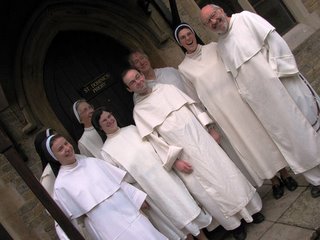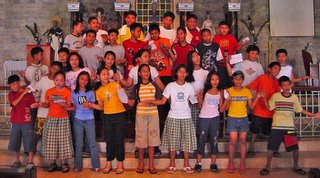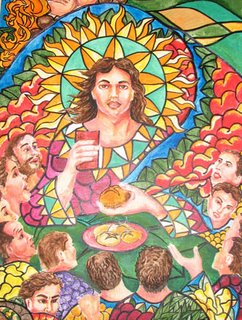As we wait in Joyful Hope...
 "Rejoice in the Lord always; again I will say, Rejoice. Let your gentleness be known to everyone. The Lord is near. Do not worry about anything, but in everything by prayer and supplication with thanksgiving let your requests be made known to God..." (Phil 4:4-6).
"Rejoice in the Lord always; again I will say, Rejoice. Let your gentleness be known to everyone. The Lord is near. Do not worry about anything, but in everything by prayer and supplication with thanksgiving let your requests be made known to God..." (Phil 4:4-6).This keynote of joy, of expectant hope in the coming of the Lord and indeed the closeness of God, is and ought to be a characteristic of the Christian life. Joy, which is distinguished from happiness is a fruit of the Spirit and rightly so, for it is profound, enduring and overcomes even persecutions, trials and tribulations; happiness is transient, passing and illusory. Joy is that foretaste and participation in the divine life which is the eternal reward of the saints. As yesterday's Gospel intimated, "Well done, good and faithful servant... enter into the joy of your master" (Mt 25:23). Joy is the proper response of the baptised to salvation and redemption in Christ and the promise we pray to be worthy of.
This keynote of joy is very much present in the letters of Blessed Jordan of Saxony and is founded on his firm expectation of the Lord's coming and his hope of salvation. This hope gave him much joy and he encouraged Blessed Diana by reminding her frequently that her troubles were as nothing compared to the rewards and joys she would receive in heaven.
Jordan's particular device in expressing joy is wine. In a letter from July 1223, he writes:
"For indeed the nuptials of the Lamb, whose right hand is filled with gifts to be given to console those who mourn out of longing for their true and heavenly country, will come quickly, and he will give sweet wine to those whose soul is suffering bitterness through thirst of love; he will wipe up the water of this present sad and savourless life and replace it by the holy and fruitful wine, that noble wine, the wine which makes man's heart glad, the wine with whose sweetness the beloved of God are inebriated, I mean the wine of everlasting joy: the rare wine, the new wine which the Son of God, blessed for ever and ever, pours out for his elect at the table of the court of heaven."
This image of wine is wonderfully expounded on by fr Paul Murray, OP and it is noteworthy that joy was such a characteristic of early Dominican preaching and I might add, is still such a feature of Dominican life today. Joy is fundamentally attractive and ought to set us apart as Christians, as redeemed in Christ, from other people. It is joy that will attract others to the Gospel, an intuition (and a reality) so well-grasped by Bl Jordan and the early Dominicans.

When I returned from the Philippines recently, I was struck by how dismal and unhappy British society seemed in comparison to the Filipino people who, although in dire poverty and difficult situations, are so joyful. I believe it is their faith, their great child-like trust and hope in God's salvation that imparts to them such Spirit-filled joy. It is this joy we need to lay hold of and communicate if we are to be effective preachers of the Gospel, which is afterall, 'Good News'! For here is a society in desperate need of joy, hope and love; the very things a Christian can offer them.
What is clear in Bl Jordan's letter is also its eschatological focus. There is little delight in the passing pleasures of this life and this world. Rather, his deep longing for the life to come is fundamental to his joy and this should be the focus of our lives too. Perhaps a certain loss in the sense of eschatological joy and the hopeful expectation of the early Christians, has led to this loss of focus and joy in our Christian lives and even diminished the attractiveness of the Christian faith. Sometimes it seems as if we live only for the pleasures of this mortal life and want to put off eternity for as long as possible. Some of us, if we're honest, may even fear the prospect of Christ's return in glory!
Our Dominican brother, Christoph Cardinal Schönborn can thus rightly say that “Today, language about man’s pilgrim path, about his homeland in heaven, of earthly tribulation and hope for life beyond death, has become largely a foreign language in the Christian churches. Is not this ‘eschatological amnesia’ of our preaching one reason why many people no longer turn to the Church when they want information about the ‘last things’? The growing belief in spiritualist practices, esoteric doctrines, belief in reincarnation, and many other such things is alarming.”
And yet, why should this be the case? Annually, the Church’s liturgy at this time of year dwells on the last things and then devotes most of the coming season of Advent to a joyful expectation of the Parousia. Advent is precisely that time of grace when we should turn our minds to the hope of future glory in Christ and we long for his return, crying out, "Maranatha!" And yet these notes of joyful expectation, of the nearness of God who is the cause of our rejoicing, the foretaste of that wedding feast alluded to by Bl Jordan of Saxony, is with us daily in the Church's liturgy.
The then Cardinal Ratzinger wrote the following in 'Eschatology: Death and Eternal Life' (1977) and I leave you with this for your prayerful reflection as we ponder the longed-for joy of Christ's return that is already ours through the sacraments, especially the Eucharist:

"The Parousia is the highest intensification and fulfilment of the Liturgy. And the Liturgy is Parousia, a Parousia-like event taking place in our midst… And so light falls on a further aspect: the interweaving of present and future which constitutes the specific mode of Christianity’s presence in the world and its openness of what is to come. The dethronement of the world elements, the fading of sun, moon, stars, has already taken place, and yet is still to come. The trumpet of the Word is already summoning us, and yet it is still to be sounded. Every Eucharist is Parousia, the Lord’s coming, and yet the Eucharist is even more truly the tensed yearning that he will reveal his hidden Glory… As the Crucified, Jesus continues to be the One who goes away. As the Pierced One with the outstretched arms he continually comes. For the loving person who keeps his commandments, his coming occurs in an ‘eschatological event’ in the midst of the world. In touching the risen Jesus, the Church makes contact with the Parousia of the Lord. She prays and lives, so to speak, into that Parousia whose disclosure will be the definitive revelation and fulfilment of the mystery of Easter. Seen in this perspective, the theme of the Parousia ceases to be a speculation about the unknown. It becomes an interpretation of the Liturgy and the Christian life in their intimate connection as in their continual going beyond themselves. The motif of the Parousia becomes the obligation to live the Liturgy as a feast of hope-filled presence directed towards Christ, the universal ruler. In this way, it must become the origin and focus of the love in which the Lord can take up his dwelling… The theme of watchfulness thus penetrates to the point where it takes on the character of a mission: to let the Liturgy be real, until that time when the Lord himself gives to it that final reality which meanwhile can be sought only in image"
May the Liturgy and the coming season of Advent be the source of our joy and preaching that we may speak words of joy, redolent with the nuptial wine of Christ's love, to all around us.







0 Comments:
Post a Comment
<< Home